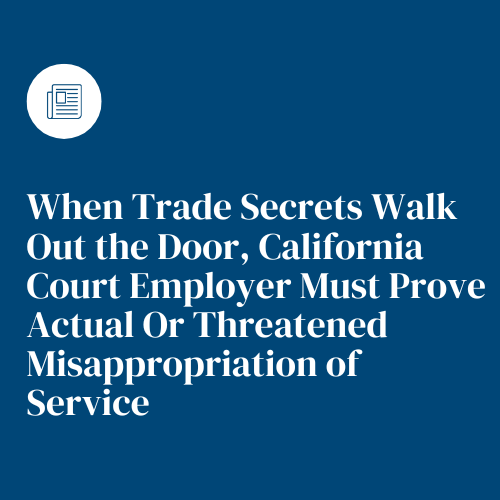When Trade Secrets Walk Out the Door, California Court Employer Must Prove Actual Or Threatened Misappropriation of Services
CONTACT
Cliff Horner
Email Address: chorner@hornerlawgroup.com
Author: Clifford R. Horner
When trusted employees leave to start their own businesses or work for competitors, they take with them general knowledge of the industry, and perhaps more valuably, specific knowledge of the past employer's clients, new products, pricing, profit margins, and key contract terms with major customers. Are these items of specific knowledge trade secrets? Absolutely. Can the employee be barred from working for a competitor due to this specific trade secret knowledge and the "inevitability" of its harmful disclosure to his new employer? Absolutely not, according to a recent case of first impression in California. In Schlage Lock Co. v. J. Douglas Whyte (September 16, 2002 DAR 1059), the California Court of Appeal held that Schlage Lock Co. could not enjoin its former vice president of sales, Douglas Whyte, from going to work for its competitor, Kwikset Corporation, even given Whyte's specific inside knowledge of Schlage's trade secrets.
Whyte's sales abilities for Schlage had so impressed the president of Kwikset (who had been losing shelf space at Home Depot to Schlage under Whyte's management) that he recruited Whyte to work for Kwikset. Schlage immediately sued Whyte and Kwikset for an injunction to prevent Whyte from working for the competitor, claiming that Whyte would inevitably be forced to disavow his confidentiality agreement with Schlage and improperly use his former employer's trade secret information in competing with Schlage at his new employer.
The Court rejected this argument stating that, while Schlage's pricing, contract terms, strategic and marketing plans, research, and process technologies all constituted trade secrets Schlage must prove Whyte's actual or threatened misappropriation or use of those secrets before any injunction could issue. The Court rejected Schlage's argument that Whyte's new employment as Kwikset's vice president of sales would "inevitably lead him to rely on [Schlage's] trade secrets," either consciously or subconsciously, in performing his new job duties, even though this "inevitable disclosure doctrine" has been adopted in the majority of jurisdictions in the United States.
The California Schlage Court held that because California public policy strongly favors employee mobility to pursue the business or profession the employee chooses (see, for example, Business and Professions Code section 16600), and because the doctrine of inevitable disclosure creates a de facto covenant not to compete, such doctrine runs contrary to California's public policy. Such inevitable disclosure doctrine "in effect converts [a] confidentiality agreement into [a] covenant not to compete," thus "rewriting] the employment agreement."
All is not lost for California employers however. As stated by the Schlage Court, "An employer might still prevent disclosure of its trade secrets through an agreed-upon and reasonable non-solicitation clause narrowly drafted to protect its trade secrets." However, "the inevitable disclosure doctrine cannot be used as a substitute for proving the actual or threatened misappropriation of trade secrets."
Subscribe to Horner Law Group Mailing Lists
Get the latest significant legal alerts, news, webinars, and insights that affect your industry.




























